Product Description
Why choose Trouble Free calming paste?
Spooky, tense, edgy, unfocused. If these words describe your horse, a calming supplement could make training easier and riding more fun. Trouble Free is scientifically formulated to support proper nervous system function and help your horse maintain a more confident, focused, and relaxed disposition.
Genetics and nutrition play a role in temperament
Your horse’s personality plays a large role in how he or she reacts to everyday life and new situations. Some horses fret and worry when their routine is changed; others are high-strung and spooky no matter what is going on! A horse’s natural flight instinct kicks into high gear when he or she is anxious or scared. Working with or riding a tense, edgy horse is a challenge, and it can be dangerous. Training a nervous horse is next to impossible because the horse is no longer able to pay attention to the job at hand.
While a horse’s personality is part of his genetic makeup, nutrition can also play a role in temperament. Research has shown that horses deficient in the mineral magnesium will show signs of nervousness. B vitamins, B vitamin related substances, and certain amino acids all play a role in proper nerve function. If adequate levels are not supplied, nerve function suffers and horses have a hard time remaining calm and focused. Horses that are constantly upset are also at risk for developing ulcers and other GI tract problems. Supplying a supplement to support relaxation and proper nerve function can greatly improve your horse’s quality of life and your ability to enjoy owning him.
Trouble Free:
- Contains alpha-lactalbumin, a unique ingredient that directly supports normal nerve function and maintains calmness
- Helps horses maintain a relaxed attitude and supports a positive experience for both horse and rider
- Provides supplemental thiamine (B1), taurine, inositol, and magnesium
Ingredients
Trouble Free contains a blend of ingredients that support normal nerve cell and muscle function in the horse.
Alpha-lactalbumin
Alpha-lactalbumin is a major whey protein found in mammalian milk and contains high quantities of several types of amino acids, including cysteine.
Researchers believe this compound helps boost the immune system. It also contains naturally occurring compounds that the body converts to serotonin that supports a positive mood and lowers stress levels.
Thiamine
Thiamine, or vitamin B1, plays an important part in the transmission of nerve impulses throughout the nervous system. It also plays a role in the normal metabolism of carbohydrates, fats, and proteins. Unlike many of the other B-vitamins, microorganisms in the intestine do not make enough thiamine to meet the horse’s needs; however, both fresh forage (green grass) and grains are good sources of thiamine. Exercising or stressed horses may have higher thiamine requirements than can be met by diet alone, so supplementation is suggested. Horses with little or no access to fresh grass may also require supplementation. Thiamine deficiencies can result in a number of different nervous disorders and hyperirritability. Some symptoms of thiamine deficiency are weakness, poor appetite, weight loss, incoordination, and nervousness.
Taurine
Taurine is an amino acid that is critical for proper nerve transmission and muscle function. Taurine assists in nerve impulse generation by standardizing the flow of electrolytes (potassium, sodium, calcium, and magnesium) in and out of the cell and it acts to stabilize cell membranes by modifying neurotransmitters like glycine and GABA. Taurine is also thought to have some antioxidant and detoxifying properties.
Inositol
Inositol is related to B vitamins and is a common component of cells. It supports electrical impulses and nutrient transfer across the cell membrane. Inositol is involved in the actions of serotonin, which reduces anxiety and supports calmness in horses.
Magnesium
Magnesium is often referred to as the “anti-stress” mineral. It aids in the maintenance of a calm demeanor by relaxing nerves, relieving tension, and modulating the electrical potential across cell membranes. It also activates enzymes important for proper protein and carbohydrate metabolism. Magnesium plays a role in many systems of the body. It aids in regularity, supports restful sleep, and helps to purify body tissue. Without adequate levels of magnesium the normal production and transfer of energy, muscle relaxation/contraction, and the conduction of nerve impulses would not occur.
Under normal circumstances, diet can meet the magnesium requirements of most adult horses; however, pregnant and lactating mares, young growing horses, stressed horses, and especially horses in moderate to heavy work have additional requirements for magnesium. While deficiencies can be seen anytime, some horses have major issues in the spring, when fast-growing grasses are high in sugar and low in magnesium. It is not uncommon for some horses to become more excitable at this time of year. Signs of magnesium deficiency include nervousness, excitability, and muscle tremors.
Serving and Storage
Serving instructions:
Trouble Free comes in an 80cc oral dosing syringe. Each syringe contains two 40cc servings. Administer one to two times daily.
NOTE: The first time you use Trouble Free it is best to administer the first serving about 3 to 4 hours prior to when you need to maintain calmness. Some horses will react sooner than others. Once you see how your horse will react to Trouble Free you can adjust the timing of administration accordingly.
Storage and shelf life:
Store Trouble Free in a cool, dry place and protect from extreme heat and freezing.
Shelf life is 24 months from date of manufacture when stored under suitable conditions.
Available size:
Trouble Free comes in an 80cc oral dosing syringe. Each syringe contains two 40cc servings.

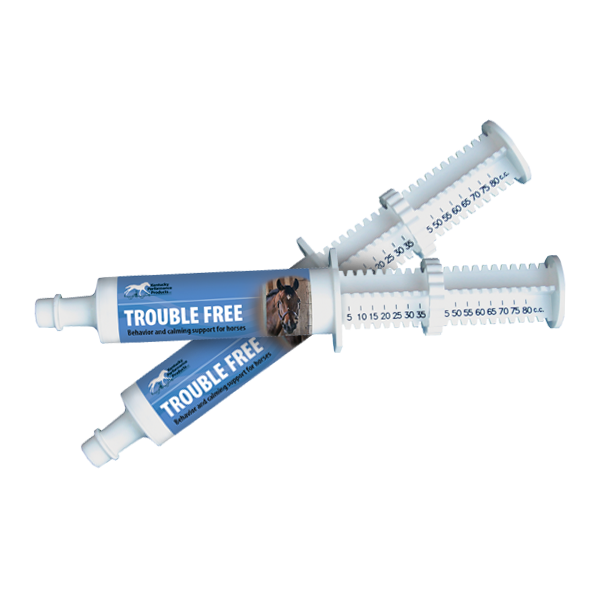

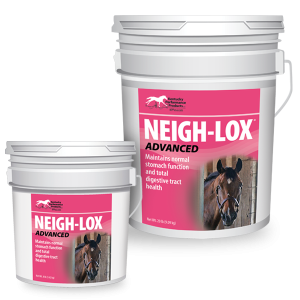
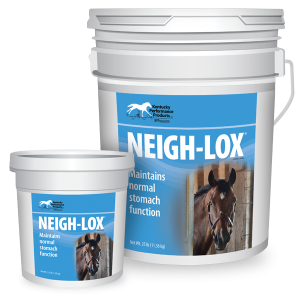
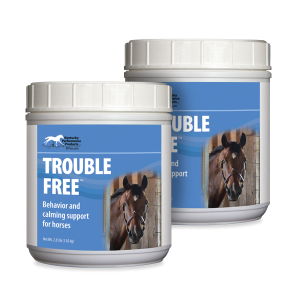
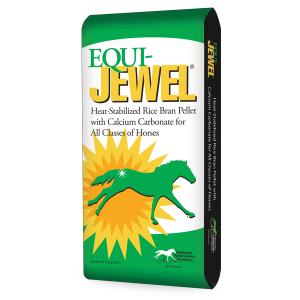

Sydney Fronk –
Going down the supplement isle at the tack store can be overwhelming! There are so many different brands of supplements, it’s hard to know what to invest in. Supplements can be expensive and they don’t always work for your horse. I was recommended Kentucky Performance Products and had seen great reviews so I wanted to at least give it a try. I am so glad I did!!
After purchasing my 7 year old gelding, it was very evident that he had a lot of anxiety. He frantically weaved in his stall all the time! This put a lot of extra stress on his front legs, especially his front right that has Navicular changes. A friend of mine recommended trying Trouble Free and it was a life changer! After a couple days on Trouble Free powder, he started to weave less and less! His eyes got softer and his sweet personality began to shine through! I had never used a supplement that worked so fast and so well! Highly recommend Trouble Free for even for the most anxious horses!
Dominique –
My typically hot, sensitive horse is always better after giving her trouble free. Whether it’s going to a show, field trip, or just an afternoon trail ride I feel the difference in my horse every time after using trouble free. It takes the edge off and just makes my mare so much calmer.